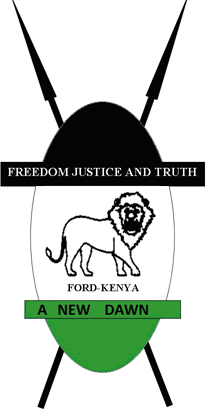Related Research Articles

The politics of Kenya take place in a framework of a presidential republic, whereby the president is both head of state and head of government, and of a multi-party system in accordance with a new constitution passed in 2010.

The National Rainbow Coalition (NARC) is a political party in Kenya. As an alliance, it was in power from 2002 and 2005 when it collapsed due to disagreements between members over a constitutional referendum.

Emilio Stanley Mwai Kibaki was a Kenyan politician who served as the third President of Kenya from December 2002 until April 2013. He served in various leadership positions in Kenya's government including being the longest serving Member of Parliament (MP) in Kenya from 1963 to 2013.

Uhuru Muigai Kenyatta is a Kenyan politician who served as the fourth president of Kenya from 2013 to 2022. The son of Jomo Kenyatta, Kenya's first president, he previously served as Deputy Prime Minister from 2008 to 2013.

Stephen Kalonzo Musyoka is a Kenyan politician who was the tenth Vice-President of Kenya from 2008 to 2013. Musyoka served in the government under the late President Daniel arap Moi as the Secretary of Kenya African National Union party (1980-1988), Assistant Minister for Works (1986-1988), Deputy Speaker of the National Assembly (1988-1992), Minister for Foreign Affairs from 1993 until 1998, Minister of Education (1998-2001); and subsequently, under the late President Mwai Kibaki, he was Minister of Foreign Affairs again from 2003 to 2004, then Minister of the Environment from 2004 to 2005. He was an unsuccessful candidate in the 2007 presidential election, after which he was appointed vice-president by Kibaki in January 2008.
The Liberal Democratic Party was a political party in Kenya. It was established by Raila Odinga and members of the National Rainbow Coalition in 2002.

Forum for the Restoration of Democracy–Kenya (FORD–Kenya) is a Kenyan political party. The party has sat in the government of Kenya once, under the National Rainbow Coalition, from 2003 to 2007, having ended forty years of one party rule. In April 2022, the party joined the Kenya Kwanza coalition for the August 2022 elections, and is headed by Moses Wetangula, the current speaker of the National Assembly of Kenya. The party tends to be more popular among the Luhya people.

Wycliffe Musalia Mudavadi is a Kenyan politician and land economist who is currently serving as Prime Cabinet Secretary of Kenya, and since 2023, in an expanded role of Foreign & Diaspora Affairs Minister of Kenya. He is a former party leader of the Amani National Congress (ANC), one of the founding political parties, of the Kenya Kwanza alliance.

Raila Amolo Odinga is a Kenyan politician who served as the Prime Minister of Kenya from 2008 to 2013. He was the Member of Parliament (MP) for Langata Constituency from 1992 to 2013 and has been the Leader of Opposition in Kenya since 2013. He is the leader of Azimio la Umoja–One Kenya Coalition Party.
The Orange Democratic Movement (ODM) is a centre-left political party in Kenya. It is the successor of a grassroots people's movement that was formed during the 2005 Kenyan constitutional referendum campaign. This movement separated in August 2007 into the Orange Democratic Movement Party of Kenya and the Wiper Democratic Movement – Kenya.

The Wiper Democratic Movement–Kenya (WDM-K), formerly Orange Democratic Movement–Kenya (ODM–Kenya), is a political party in Kenya, which originated as a result of the 2005 Kenyan constitutional referendum. The party tends to be more popular among the Kamba people. It is headed by Kalonzo Musyoka, who ran for president in 2007 and served as the vice-president in the Grand Coalition of Mwai Kibaki and Raila Odinga. He is now a member of the main opposition Azimio La Umoja One Kenya Party.

General elections were held in Kenya on 27 December 2002. Voters elected the President, and members of the National Assembly. They coincided with the 2002 Kenyan local elections.

The Party of National Unity (PNU) is a political party in Kenya originally founded as a political coalition. On 16 September 2007, Kenyan President Mwai Kibaki announced the party's formation and declared that he would run as its presidential candidate in the December 2007 Kenyan elections. Following the conditions set by the Political Parties Act which were passed in Kenya in 2008, PNU became an official political party. Recently PNU has launched activities to revamp itself ahead of the 2022 general elections.

General elections were held in Kenya on 27 December 2007. Voters elected the President, and members of the National Assembly. They coincided with the 2007 Kenyan local elections.
The 2007–2008 Kenyan crisis was a violent political, economic, and humanitarian crisis in Kenya. The crisis erupted after incumbent President Mwai Kibaki was declared the winner of the 2007 presidential election. Supporters of Kibaki's main opponent in that election, Raila Odinga of the Orange Democratic Movement, alleged electoral manipulation. This position was widely confirmed by international observers, as being perpetrated by both parties in the election. Even the head of the electoral commission himself confirmed that he did not know who had won the elections despite announcing the incumbent as president.
The Waki Commission, officially The Commission of Inquiry on Post Election Violence (CIPEV), was an international commission of inquiry established by the Government of Kenya in February 2008 to investigate the clashes in Kenya following the disputed Kenyan presidential election of 2007.

A constitutional referendum was held in Kenya on 4 August 2010. Voters were asked whether they approved of a proposed new constitution, which had been passed by the National Assembly on 1 April 2010. The new constitution was seen as a vital step to avoid a repetition of the violent outbursts after the 2007 general elections.
The inauguration of Uhuru Kenyatta as the 4th president of Kenya took place on 9 April 2013. Kenyatta won 50.07% of the vote in the 2013 presidential election, after the supreme court dismissed the Raila petition on 30 March 2013. According to Article 141 (2) (b) of the constitution, in case the Supreme Court upholds the victory of the president-elect, the swearing in will take place on "the first Tuesday following the seventh day following the date on which the court renders a decision declaring the election to be valid." The event was held at Kasarani Stadium.A reception bouquet took place at State House,Nairobi.

The National Alliance (TNA) was a political party in Kenya. It took on its current identity when Uhuru Kenyatta assumed control and renamed it as the vehicle for his 2012 presidential campaign.

The 2018 Kenya handshake was a political truce made on the 9th of March 2018 between Kenyan President Uhuru Kenyatta and former Kenyan Prime Minister Raila Odinga. The two had been the leaders of opposing political factions amidst widespread political violence and civil unrest; they had previously faced one another in the contested 2017 Kenyan general election. Under the agreement, their political feud was resolved, with Kenyatta agreeing to support Odinga in the upcoming presidential elections. As a result, the Azimio coalition was formed, Uhuru became its chairman, and Odinga as the presidential candidate with Martha Karua as his running mate. They lost to William Ruto, who was Kenyatta's deputy at the time. They challenged Ruto's victory in the Supreme Court, however, Chief Justice Martha Koome said his claims did not meet the evidentiary threshold and dismissed the case. At a March 2023 protest in Nairobi they demanded an audit of the IEBC election servers.
References
- ↑ Annan hails Kenya talks progress, BBC, 21 February 2008.
- ↑ "Salim Lone profile on The Guardian". The Guardian. Retrieved 17 January 2015.
- ↑ `We're all Kenyans here' Archived 2008-04-22 at the Wayback Machine , By Shashi Tharoor, The Hindu, 7 November 2004.
- ↑ Tharoor, Shashi (2007). Elephant, Tiger & Cellphone. Penguin Books India. p. 329. ISBN 9780670081455.
- ↑ Uwechue, Raph (1991). Africa Who's Who. Africa Journal Limited. p. 1003. ISBN 9780903274173.
- 1 2 See: Portrait of Salim Lone, Kenya's Political Gadfly. 12 January 2007
- ↑ AROUND THE WORLD; U.N. Official Stripped Of Kenyan Citizenship, The New York Times, 10 September 1986
- ↑ Blast hits UN building in Baghdad, BBC, 19 August 2003.
AFTER THE WAR: THE SCENE; Amid Blood and Rubble, A Sense of Helplessness, NYT, 20 August 2003 - By NEIL MacFARQUHAR - ↑ The Nation: Salim Lone
- ↑ selvesandothers.org: Salim Lone.
- ↑ raila2007.wordpress.com: Raila Odinga's Campaign blog. Lone's appointment mentioned 23 November 2007.
Opposition Seeks New Vote As Violence Ebbs in Kenya, NYT, 5 January 2008. - ↑ raila2007.wordpress.com: Raila Odinga's Campaign blog. Lone's appointment mentioned 23 November 2007
Opposition Seeks New Vote As Violence Ebbs in Kenya, NYT, 5 January 2008. - ↑ Why Has Salim Lone Fled From Kenya?. Famous Veteran Kenyan Journalist, ODM Communications Chief And Former United Nations Media Director Tells Friends That He Feared For His Life. Kumekucha1 Confidential, 18 February 2008.
- ↑ New Cabinet Announced In Kenya, New York Times, 14 April 2008.
- ↑ PM spokesman Salim Lone retires, Kenya Broadcasting Corporation, 10 September 2008